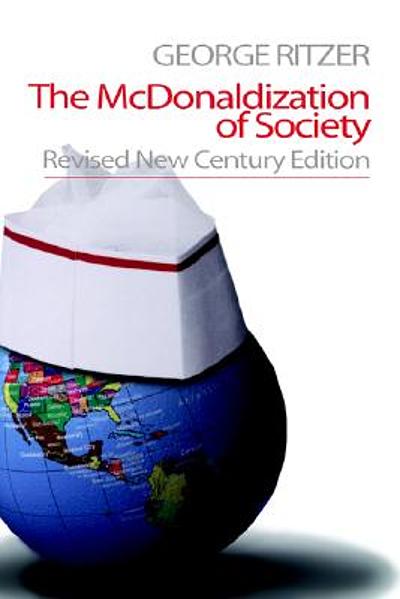Have you ever felt like life is a constant race against time, a never-ending quest for efficiency and speed? From the fast-food chains that dominate our lunch breaks to the online algorithms that curate our news feeds, a sense of uniformity and predictability seems to permeate our world. This very phenomenon, this drive for standardized and efficient processes, is what sociologist George Ritzer termed “McDonaldization.”

Image: webapi.bu.edu
But what exactly does this term encompass, and how does it impact our lives? By exploring the principles of McDonaldization, we’ll discover how this powerful force shapes our experiences, our values, and even how we perceive ourselves.
An Efficiency-Driven World: The Four Principles of McDonaldization
McDonaldization refers to the process by which the principles of fast-food restaurants – efficiency, calculability, predictability, and control – are applied to an increasing number of aspects of modern life. Think of it as a metaphorical lens through which we can analyze the increasing rationalization and standardization of society.
1. Efficiency: The Quest for Speed and Optimization
At its core, McDonaldization is driven by a relentless pursuit of efficiency. Think about the assembly line in a McDonald’s kitchen – a meticulous choreography of actions geared toward producing burgers as quickly as possible. This obsession with speed spills over into other areas of life, from online shopping that promises instant gratification to express delivery services designed to minimize wait times.
2. Calculability: Measuring Success by Numbers
McDonaldization prioritizes quantifiable results, often at the expense of quality. We quantify our worth through metrics like likes on social media, follower counts, and the number of emails we send. Educational institutions are increasingly judged by standardized test scores, and even our own personal progress is often measured in terms of “likes” and achievements.
3. Predictability: The Comfort of the Familiar
McDonaldization craves uniformity and predictability. When you walk into a McDonald’s in any corner of the world, you know exactly what to expect – the same menu, the same décor, the same routine. This sense of predictability extends beyond fast food, influencing how we consume media, how we shop for groceries, and even how we interact in the digital sphere.
4. Control: Minimizing Human Error
McDonaldization seeks to exert maximum control over every aspect of the experience. Automatic machines replace human cashiers, surveillance cameras monitor our every move, and algorithms dictate our online interactions. This focus on control extends even to our own bodies, as we become increasingly dependent on external technologies for fitness trackers, sleep monitors, and even our diets.
The Shadow Side of Efficiency: The Dehumanizing Potential of McDonaldization
While McDonaldization can offer convenience and speed, it also raises concerns about the cost of this efficiency. Critics argue that it can lead to:
-
Dehumanization: As we become accustomed to being treated like cogs in a machine, we risk losing our individuality and sense of agency. The focus on efficiency can overshadow the importance of human connection, empathy, and creativity.
-
Alienation: The standardized nature of many aspects of our lives can lead to feelings of disengagement and alienation. When our lives are constantly measured against impersonal metrics, we can lose sight of what truly matters to us.
-
Loss of Quality: The relentless pursuit of speed and efficiency can lead to a decline in quality, from the food we eat to the products we consume.
-
Limited Choices: The predictability and uniformity fostered by McDonaldization can limit our range of choices, ultimately narrowing our experiences and our options.
Rethinking Efficiency: Reclaiming Our Humanity in a McDonaldized World
While we can’t escape the influence of McDonaldization, we can consciously resist its dehumanizing effects. Here are a few steps we can take:
-
Prioritize Human Connection: Make a conscious effort to engage with others in meaningful ways, fostering real conversations and building relationships beyond the confines of online platforms.
-
Seek Out Authentic Experiences: Explore activities that challenge the standardized nature of our lives, whether it’s a visit to a local farmers market, a hike in nature, or a creative pursuit that ignites your passion.
-
Question the Metrics: Don’t be swayed by the allure of quantifiable success. Instead, prioritize personal fulfillment and values, focusing on what truly matters to you rather than the expectations imposed by society.
-
Support Small Businesses: By patronizing small, independent businesses, we can foster a more human-centric economy, resisting the homogenization of products and services.

Image: www.slideshare.net
The Mcdonalidization Of Society Refers To
Embracing a More Human Future
McDonaldization is a powerful force, but it cannot define us. By acknowledging its potential pitfalls and actively seeking ways to counter its dehumanizing effects, we can create a society that values both efficiency and human connection. This requires a conscious effort to reclaim personal agency, prioritize human relationships, and seek out experiences that nourish our spirit.
Let’s work together to create a future where we are not merely cogs in a machine, but rather empowered individuals who embrace the full spectrum of human experience – from efficiency to creativity, from predictability to spontaneity. The future of our society depends on our ability to navigate the challenges of McDonaldization with a renewed focus on our shared humanity.



/GettyImages-173599369-58ad68f83df78c345b829dfc.jpg?w=740&resize=740,414&ssl=1)


